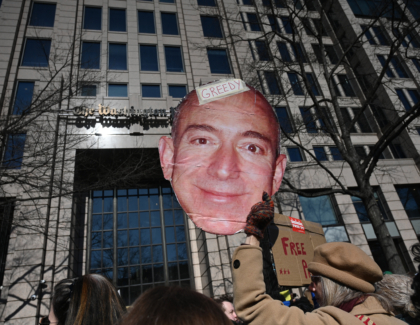Sign up for the daily CJR newsletter.
After Maj. Nidal Malik Hasan’s deadly rampage that killed thirteen people and wounded another thirty at Fort Hood in Texas last week, journalists and commentators struggled with the question of how, exactly, to characterize the attack. Some were quick to condemn his spree as an act of terrorism; others cautioned against hanging any labels on the attack before all the details were in.
More than one week later, the debate continues. In a New York Times column this week, David Brooks criticized the “shroud of political correctness” that had been draped over the discussion. On his Wednesday show, Glenn Beck said, “This man was a Muslim, terrorist, extremist. End of story.” A Time cover features a photograph of Hasan’s face obscured with black tape over his eyes; written on the tape, in bold typeface, is a simple question: “Terrorist?”
Dave Miller, the deputy managing editor of the Killeen Daily Herald, the hometown paper for Fort Hood, and his staff have had to grapple with that very question over the past week. Here’s how they’re handling it:
A Watch-and-Wait Policy
“It’s been pretty simple from our standpoint. We’re deferring to the Army officials here. They’re still doing an internal investigation, the FBI too, and of course Joe Lieberman is saying Congress needs to investigate because he says this looks like terrorism.
“But if the Army is not going to label it as such, we’re not going to go with it. We have very close ties with the Army here and we don’t want to jeopardize that by throwing around terms that they haven’t used. I’m not saying we’re going to say whatever they say and just parrot it back. In the editorial pages, that’s something different. If we decide to talk about how this might be viewed on a larger scale, that might be an opinon piece. And opinion here runs the gamut from those witholding judgment to some ready to bomb the Middle East. Meanwhile, the fact is, [Hasan] is not even from there.
“So on the ground floor, base level, we’re looking at it like it’s another Luby’s massacre or Virginia Tech massacre; one unstable individual who went crazy and started killing people. Is there a bigger problem the Army has to deal with? I think so. We’re starting to hear the federal government was at some level aware of his postings and his talk for the past few years. They not only sent him here but put him in a position where could deploy with a weapon. From that standpoint, it’s troubling. But until we can prove [it’s] not just all talk, we are watching and waiting.”
Two Sides to a Story
“He could have been any unstable guy. Someone supposedly was there, heard him say praise be to Allah before he started shooting–but those could be the words of somebody who thought he was about to commit suicide.
“If this guy left a note or posted a bunch of stuff on his laptop—the fact that he was giving away his stuff and furniture, well he was about to deploy. That doesn’t mean anything. It’s something different to a defense attorney and to a prosecutor. So we’ve decided to let the evidence pile up. We’re not saying anything yet, but that’s not saying we won’t have something new that would change the picture tomorrow.”
Local Reaction
“Here, people are more in shock that it happened, and not by somebody breaking in, but by the fact that this guy is one of their own. At the moment we’re focusing more on the healing process and how the community has rallied. So we’re leaving the investigation to the Army and federal officials.
“On an individual level, opinions range about the nature of the attack. As a newspaper, we’re steering clear. We will report what newsmakers say–Joe Lieberman and the rest. But we’re not ready to couch it as that (Islamic terrorism) until we hear people say ‘Yes, that was his motive.’
“We’ve had a lot of letters to the editor that we can’t print because they’re that over the line. So we’re just going to walk the middle line until there’s a preponderance of evidence. If you called it an act of terrorism, around here, maybe 75 percent of people would agree, but 25 percent would say ‘Where are you getting that definition?'”
Semantics
“Does this make it any worse if he was a “terrorist” or just an unstable murderer? Either way the folks are dead and [the Army] needs to revisit their policies and screenings whether he was a terrorist or not. Labeling him one thing or another doesn’t change the situation.”
News Judgment
“The day this happened, I was on the phone to Fox News. They didn’t have their people here yet. Our police reporter was on the scene of the shooting. He told us that the shooter had an Arabic-sounding last name. I had that info about an hour before it was picked up by MSNBC, Fox or anybody else and I didn’t use it. I had three different interviews with television news, I didn’t mention it. Why fan the flames? We had one source, and it doesn’t really add to the conversation. When you first come out with something and don’t have all the facts, to just throw it out there, that’s just incendiary, and no one needs that. That’s where we are with the terrorist thing.”
Sticks and Stones
“Words have impact and we have to worry that if you put something out there that may be your view, but there are no criteria established–all you’re doing is stirring the pot. There are a lot of veterans around here who are going to get mad at us for not using the terrorism word, but the facts are out there and you can make your own judgment—and people are.”
Has America ever needed a media defender more than now? Help us by joining CJR today.






